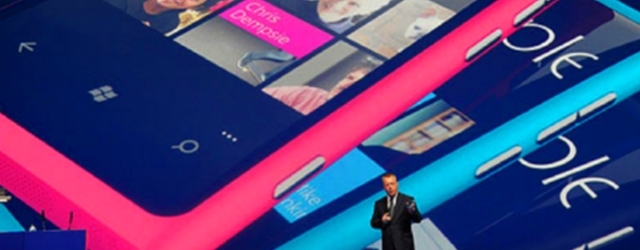Nokia’s Lumia handsets have been met with broad approval by the media, who have praised the colourful and solid hardware designs, matched with the undeniably impressive Windows Phone OS. But when it comes to sales, the only opinion that really matters is that of the buyer – and consumers have so far failed to flock to Lumia handsets in anything like the numbers that Nokia had hoped for.
Little wonder, then, that many financial organisations continue to adjust their forecasts for Nokia downwards, as the company keeps failing to live up to its considerable potential. The latest organisation to downgrade Nokia is Credit Suisse, one of the world’s largest and most prestigious financial institutions, moving the company from a ‘Neutral’ rating to ‘Underperform’.
As StreetInsider.com reported this week, Credit Suisse’s assessment of Nokia suggests that the company will continue to burn through its cash reserves for the immediate future, and is likely to see further heavy operating losses during 2013. The transition to Windows Phone 8 – essentially another ‘reboot’ for Nokia’s smartphone range, as no first-generation Windows Phones will be eligible for upgrade – is expected to be “slow and challenging”, adding to Nokia’s woes.

Many believe Nokia underestimated the scale of the challenge of selling its Windows Phones in significant numbers
But far more damning than the rating downgrade is the suggestion that Nokia should realistically consider breaking the company up and selling off its most valuable components; Apple would be a candidate for acquiring Nokia’s valuable intellectual property portfolio, while Ericsson, Huawei and ZTE have been named as possible buyers for chunks of Nokia Siemens Networks. No-one, believes Credit Suisse, would have any realistic interest in acquiring Nokia as a single entity, indicating that a sell-off of the company as a whole would be unlikely.
But is any of this likely? Well, Nokia’s share price is trading well below book value – meaning that the total value of its shares (also known as its market capitalization) is less than the sum total of its assets (cash, patents, buildings, inventory, equipment etc) minus its debts – a situation that some refer to as “worth more dead than alive”. Selling high-value assets like its IP portfolio (estimated by some to be worth as much as $7.5bn) would certainly bring respite for beleaguered investors.
But a complete break-up of the company is hugely unlikely, especially as Nokia isn’t really in the kind of immediate, terminal decline that some claim; its situation is perhaps best described as “prolonged stagnation”. The company still sells its feature phones in colossal numbers worldwide, and its Lumia smartphone sales are growing (albeit far slower than expected or hoped). Microsoft, too, has a vested interest in ensuring that Nokia remains a going concern (MS already pays $1bn a year to Nokia in ‘Platform Support Payments’ for Windows Phone usage, for example).

The ultimate Windows Phone that never was? Nokia sold its Vertu luxury handset division earlier this year
Nokia has already been selling off ‘non-core’ assets, such as its Vertu luxury device division (for around $250m); more recently, it was revealed this week that the company plans to sell off and lease back its global headquarters in Espoo, Finland, to bring in another $350m or so. We may yet see further non-core assets divested – perhaps even a sale of the company’s Navteq division to Microsoft, as suggested in this editorial from May – but Nokia’s situation would have to deteriorate considerably before investors are ready to take Credit Suisse’s advice, and call it a day on Nokia as we know it.
Source: StreetInsider.com | Top image via The Guardian


















26 Comments - Add comment